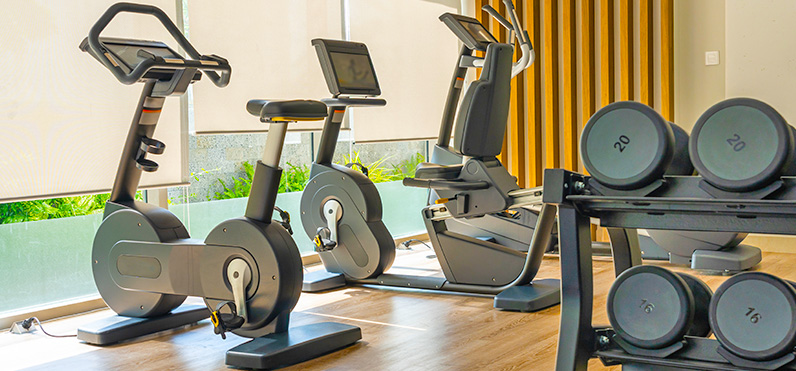With Massachusetts seemingly on track to progress to Phase Three of its re-opening on July 6th many condominium associations are assessing whether to open additional amenities, most notably fitness centers and gyms.
Regardless of the restrictions imposed by the Governor’s Office, associations who are considering opening fitness centers should be implementing certain minimum safeguards to protect the association from potential claims and to ensure that residents are provided with the safest environment possible.
Guidance for the use and operation of fitness centers will likely be released in the coming days, however based on the restrictions imposed in previous phases, condominium associations can anticipate certain restrictions and begin to plan for what will certainly be characterized as a “limited” re-opening of fitness centers, at least initially. Regardless of the restrictions imposed by the Governor’s Office, associations who are considering opening fitness centers should be implementing certain minimum safeguards to protect the association from potential claims and to ensure that residents are provided with the safest environment possible.
It is a certainty that occupancy limits will be established as a condition to re-opening of a gym, so boards should explore how they and/or their managing agent will monitor usage in order to comply with regulations. Boards should consider access by advance reservation and block off equipment to create separate “zones” available for use (e.g. cardio, free weights, etc.). Boards will also need to evaluate whether current staffing affords the opportunity to monitor the activity within the gym, otherwise it may be necessary to hire someone to handle oversight. The size, layout, and capacity of the facility will impact what restrictions are necessary. Additional measures to evaluate in connection with at reopening plan include:
• Require individuals to clean/disinfect equipment after each use.
Disinfectant wipes and hand sanitizer should be made available to residents;
• Require the use of PPE while in the facility;
• No joint workouts;
• No guests;
• Turn off fans. Some associations may want to consider enhancements of ventilation and air handling within the space, which could include installing portable high-efficiency air cleaners or upgrading air filters or other modifications that increase outside air. These modifications should be evaluated by an HVAC professional and/or a mechanical engineer;
• If previously offered, associations should temporarily discontinue towel and water service;
• Put up directional signage on how to traverse the fitness center; and
• Hot tubs, saunas, and steam rooms should remain closed.
Boards should ensure that the rules and restrictions are disseminated in writing to all unit owners and residents and are also displayed conspicuously throughout the facility. Anyone who uses the fitness center should be required, for each visit, to sign a waiver which should include an acknowledgement of the risk of infection; a certification that the user is not presently infected with COVID-19 and has not come into contact with a person who has tested positive; does not have a fever or other symptoms consistent with COVID-19; and an acknowledgment that the board does not guarantee a virus-free environment. It is important for boards to honestly assess the ability to implement and enforce the required restrictions. If an association is unable to monitor activity and compliance, it should consider delaying the opening until it can effectively do so, or until restrictions and guidelines are eased.
Pools
On June 8th Massachusetts officially entered Phase 2 which included the opening of swimming pools. While associations were permitted to begin opening outdoor pools, many have chosen to keep those pools closed for the time being, and some have made the decision to keep them closed for the season. As with fitness centers, and any amenity for that matter, it is important to assess the ability to both implement and adhere to the relevant guidelines. Most associations will be faced with increased costs to operate their pool under existing restrictions, and boards should evaluate those costs along with their particular risk assessment.
When preparing a pool re-opening plan an association will need to pay close attention to the occupancy limits established by the Commonwealth (currently set at 40% of the capacity of the entire pool facility), as well as any local regulations which, in some cities and towns, may be more restrictive that what has been established at the state-level. The complete set of safety standards and regulations for public and semi-public pools can be found here. In addition to the required regulations and standards, associations should also consider the following while developing a re-opening plan:
• Limit usage to residents only;
• Hire a monitor (lifeguards should not be COVID monitors);
• Set up a registration process;
• All users should be required to sign a waiver for each use;
• Display signage required under the state guidance at every entrance;
• Move or remove pool deck furniture to facilitate social distancing
• Masks must be worn on the pool deck but not required in the water;
• No pool toys (floats, noodles, rafts, balls, toys, squirt guns, etc.);
• No games in the pool;
• Review contracts with pool operator, cleaner, lifeguards, etc. to ensure vendors are contractually required to follow COVID-19 protocols; and
• No towel service/common food services
Roof Decks & Common Gathering Areas
Many associations are also opening roof decks and similar common areas used for entertaining. Boards should be sure to establish maximum occupancy limits and prohibit any gathering of more than ten individuals in any common area space. While we don’t generally view roof deck use as critical for obtaining a waiver (as opposed to a fitness center or pool), associations could utilize a general amenity waiver in certain circumstances. Whether or not you have a waiver, you should have clear and visible signage about the rules for use of the roof deck and have communicated the rules/protocol for use of that space to residents in advance.
For those associations with grills or outdoor kitchens, when evaluating whether you should permit residents to use those common food preparation stations boards should think about what cleaning protocols can be established. Because these areas are considered “high-touch” they should be cleaned and sanitized after each use, and the association should increase the frequency of its general cleaning schedule. Depending on building staff and cleaning arrangements, it may be possible to let people sign up to use in limited blocks and, at the end of each block, they can be cleaned by staff or cleaning crews (owners should also be required to wipe down after each use). Residents should provide their own utensils but the association should make disinfectant wipes available For those associations with common patio furniture, those items can be made available for resident use but should be arranged so that there is at least six feet between each piece of furniture and the residents should be require to wipe down the item after each use.
It important for boards and their managers to remain updated on the ever-changing guidelines and restrictions. What might be required today could be modified tomorrow and associations need to be prepared to adjust in real-time by either updating their rules or temporarily closing the amenity until the required safeguards can be implemented.


